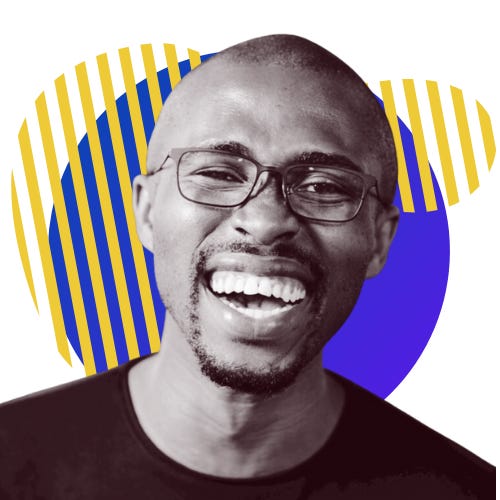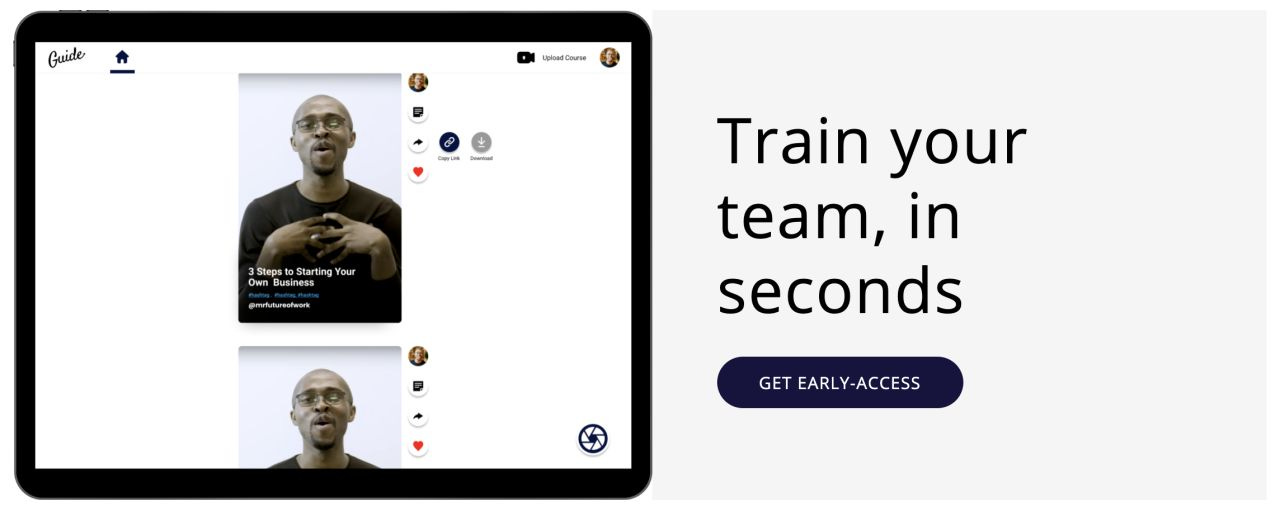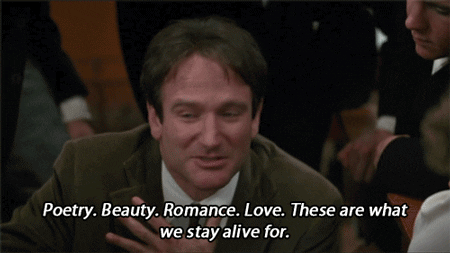🧑💻 The Future of Work: An Interview with Tim Salau
I interviewed Tim Salau, former Microsoft and WeWork, now the Co-Founder and CEO of Guide (19 min read)
Homescreens is a publication about how we interact with our most intimate possession, our phones. Each week I interview founders and creators across industries, and we reflect on the apps they use, how they’re organized, and their philosophy on notifications and mindfulness. Check out the end of the interview for a full recap and links to all the apps and media discussed.
If I were tasked with describing Tim in one word, it would be passionate. It hits you immediately when you speak with him — you can be on a Zoom call, in a Twitter thread, via email — it doesn’t matter. Tim’s passion isn’t lost in weightless words either; he transforms his passion into purpose by mentoring others and making his life purpose to “strengthen the bonds people share through compassionate action.”
Tim is a first-generation college graduate, and after graduating with his Masters in Information Science from The University of Texas at Austin, he has led product and innovation at the likes of Microsoft, WeWork, Google, and Facebook. Now, Tim “Mr. Future of Work” is helping remote teams learn on-demand with his company Guide (guideapp.co), which he co-founded in 2019 and serves as its Chief Executive Officer.
What follows is our interview, edited for length and clarity.
Jason: Before we jump into your phone, I’d like to hear your story! You worked at Microsoft as an AI Product Manager; you worked at WeWork —you're going to have to tell me what a Chief Evangelist is, by the way. Now you’re off to do your own thing with Guide. What gave you the entrepreneurial spark to start your own company?
Tim: I've been really grateful, man, and fortunate, especially as an anomaly in tech being a black male, to work with some of the greatest companies in the world and learning a lot in the process. But you know, even before I really worked at any companies, I’m just a Nigerian kid, who is a son of two loving parents and a brother to two amazing sisters.
My parents actually moved to the United States to give us access to better education opportunities. My parents are incredibly well off in Nigeria, but in 1999 they realized there's an opportunity for us to move to America to give their son and daughter a better opportunity to grow and build their own careers. That's because in Nigeria at the time, the education system was broken. It was broken because there was a lot of bureaucracy, there was a lot of elitism, and there was a lot of fundamentally just toxic nepotism, especially within the Nigerian government. It's not always fair. So they realized they wouldn't be able to provide us with the best access to education, even though we were well off there, so they moved us to America and completely started over their lives, their identities, and really fundamentally, our future.
I think that played a huge role in my upbringing and my passion for education. So during the course of my life, I was grateful. I went to elementary school in the hood, and I eventually went to high school in the suburbs and saw how life looked — like the diversity of life and the beauty of life there. Then when it was time for me to go to college, I went to Texas Tech University for my undergrad, and then I got my masters at UT Austin in Information Studies. After that, I got my first role with Microsoft, and I've done stints with Facebook, I've done stints with LinkedIn, I've done a variety of different hodgepodge things in my career. And eventually, for me, when it came to building Guide, it really stemmed back to my passion, and really the core reason why my parents moved to America — for education!
I've always been an avid learner, like, I've always loved reskilling myself and adapting to different environments. I think the most adaptive and successful people in the world — they're shapeshifters — they understand how to learn their way and problem solve. So when it came to the opportunity for my co-founder and I to build something around an area we were both passionate about, Guide made sense. While I was with WeWork, and while I was with Microsoft, I was building the company, but it eventually came time for me to go full-in on it. I realized this is going to be my life's work because I'm uniquely positioned to build a movement around it. And since then, man, we've been doing well, we've raised capital, we're currently raising our seed as well, and we’re in market. It's been quite a journey thus far.
Jason: That's awesome! I've seen you describe Guide as the only social-first learning and talent dev program for enterprise. Can you describe what that means, social-first? I watched an older interview, and you mentioned that you see future companies treating employees as social media influencers.
Tim: Yeah man, great that you bring that up. I think the future of work is that you have to empower your people, the talent, to be the stars of your organization, whether junior level, mid-level, or senior level. And most organizations don't do that, right? The reality is that every organization has creators, and many of them aren't unlocking their full potential because of the culture; it's toxic. It's just not the type of culture where people are empowered and feel that they can be on a platform, and fundamentally feel as if they can build their brand. But in the current work landscape that we're living in, your talent is actually your greatest asset.
Now, if you think about it, technology is a commodity. For many organizations, any startup can build technology; any enterprise can steal technology and repurpose it for whatever means. There's no proprietary uniqueness to technology, right? So when you think about technology being a commodity, there are millions of markets out there that you can build a product in. And when you really fundamentally think about the core common denominator for every great organization, it's their talent! Their talent and their culture, that's really it. So if you don't have great talent and don't have great culture, you're not going to stand out in the marketplace. What makes the product special is culture.
An example would be Airbnb — talented, amazing, very community-oriented, it makes Airbnb special. For me, when I think about Guide, you know, we exist to help organizations grow their talent and help them focus on onboarding, new hire training, but doing it with our platform to make it fun and make it interesting. We're focused on bite-sized video training. We've been describing it to a lot of investors as if TikTok and MasterClass had a B2B baby — that's Guide! The reality is that so many of the customers on our waitlist right now, they’re like, “I see it, I see the opportunity, and I see how we can really unlock the potential of my workforce.” That's what keeps me going every single day — that they see the vision.
Jason: How do you feel about companies encouraging their employees to dive into the things they're passionate about and spin up their own side projects? You mentioned working on Guide while you were working your day job.
Tim: Every company should reward that because entrepreneurial vigor is what many people look for in the workplace. A great example is my co-founder and me. I'm a serial entrepreneur and founder, and Guide is our founding company. I also invest in startups, we have a venture studio where we work with a variety of different startups, and we help them build their own next big thing. We're always finding ways to create value, not only within our own company but beyond our company, because we want to see people grow. We're very focused on empowerment and growth within Guide. The biggest thing about entrepreneurship is that you learn a lot through entrepreneurship, whether or not you want to build a billion-dollar venture.
A great example of this would be Google; they always had a side project where people can learn a new skill in a different area or meet new people because they can learn from that. What Google realized is that a lot of people stayed because of that. Because it allowed them to expand their horizons and not feel as if they were married to a role. For me, one of the biggest things I see in our culture is that I want people to feel like they're always growing within Guide. So I'm always saying, “Okay, how do we uplevel you either within the company or how do we uplevel you beyond the company, if there’s an opportunity?” Because the reality is that there's no person in today's day and age that needs to work within a company for 10 years or 15 years. That's way too long. I don't want employees to work within our company for 10 years, because what that tells me is that if they work with my company for 10 years is that we failed. We didn’t do our job in growing them to bigger opportunities.
You look at the data, whether it be the Google's or the Facebook's, a lot of people make a lot of lateral shifts, either internally, or they eventually say, “Okay, one or two years is good, where's the next company in The Valley that I could work with?” That's because they're all looking for growth. You see a lot of it in tech, but I see it in a few other industries in the next few years because the culture is shifting to crafting your career versus being stuck in your career.
Jason: Absolutely, I love your insights. And I’ve got to ask, is Big Black Tea a Guide side project?
Tim: So that’s part of my personal business but also maintains its place in parallel to Guide because we're doing it for our Guide community. I think I realized that the world needs more tea, man! There's so much shit that's happened in 2020; it makes me sad. But I realized, let's just do something while we're building Guide, let's do something we know our community can get their hands on immediately and can be something that comforts them through this economic downturn, through the social unrest, and all of this polarization that's going on in the world right now. I see tea as an aide, I drink a lot of tea myself, and it allows me to keep peace. It allows me to kind of stay in a very meditative state. I've been really impressed by just how many people have been so supportive of it, the world really loves tea, and I'm really grateful.
Jason: Well, congrats on the launch! I’ll have to try it!
Let's dive into your phone. Besides your white blank background and alphabetized folders, what caught my eye immediately was your dock. Typically I’ll see like Phone, Email, and Slack down there. You have Hoopla, Blinkist, and Audible. Immediately, I can tell where your priorities are. I haven’t used Hoopla before, but that’s for renting audiobooks, right?
Tim: Yep, yep, I’m a big audio learner! And dude, Blinkist is amazing. It’s like bite-sized audio learning of your favorite books. I love that. For me, I use Audible as more long-form and in-depth if I really want to go deep in a book and digest it. But here's the thing — I hate 15-hour books! If you ever listened to 15-hour books, you know the person didn't write it! [laughs] They completely just repurpose content and put it there. The best books are like four hours or less, like literally four hours or less is the limit, and you can finish out within a day or two days, even if you're reading multiple.
I kind of crossfade in a way, where I'll go to Blinkist for bite-sized learning on the go, and then Hoopla and Audible are more in-depth, you know, really feeling the material. I always try to find an opportunity to learn something new. Blinkist is a part of my daily regimen; it's like daily meditation for me.
Jason: What are some of your recent favorite books you’ve listened to?
Tim: I recently just read a book called Ghetto by Mitchell Duneier. It essentially chronicles how the word “ghetto” actually started with Jewish encampments during the Holocaust and then how it spread into African American communities. It's really been a part of the gentrification we've seen due to systematic racism, especially back in the early days before the 60s. I think it's interesting because you get a sense of how a word tends to matriculate and define a community. The reality is that ghettos didn't start with African American communities; they started during the Holocaust, around Jewish encampments.
I think there's a lot of sadness in that word. I just read the book and the history around it, and we shouldn't use that word. It's one of those negative words, and we shouldn't create spaces where people feel like it's a ghetto. Fundamentally, the reason why ghettos exist is often due to prejudice and systematic racism and bad intentions. I think we're moving towards a world where we think about how people live and micro-communities where you don't want to create those kinds of environments anymore. People want better. Even people in low-income communities have the ability to create greater environments for them if we think about ways to support them, whether it be with financial literacy and upskilling, or, more fundamentally for our space, education. Reading Ghetto was just a deep dive into the history of that word and why does it exist. You'd love it, man.
Jason: That sounds super interesting and one I’ll have to check out. Diving back into your apps. I see you’re using Affinity CRM; what made you choose this CRM over Salesforce, HubSpot, or something like that?
Tim: So Affinity is more tailored to investors. It's just an amazing CRM, it’s user friendly, and I love the user experience. It's more tailored to VCs and founders. So out of my own personal business fund, I invest in companies, and then for Guide, I develop a lot of relationships that I manage through the CRM. Having a personal CRM has been really super helpful for me in terms of managing relationships and seeing who I should reach out to, because you can keep it all in your brain, but then, you won't know who to reach out to when the time is right. That's actually why I went with Affinity. HubSpot and the Salesforces of the world, they're more for your enterprise type level. Their experience is way too in-depth. It's kind of clunky, so it was a much better fit to go with Affinity.
Jason: That makes sense. And the Front app, I found it in the App Store, and it looks like a G Suite alternative?
Tim: Bro, Front is lit. Front is a Gmail alternative. And it’s lit, I love it. I love it because it's really well designed. There are automation workflows that allow you to automate certain processes of email, but it's focused on team collaboration. In fact, I actually want to get Front for our company, Guide. I use it for my own individual self because I just love it. It's a better experience than Gmail; I got tired of Gmail. It's kind of like Superhuman, but it's a little bit different; it has the same type of design aesthetic and simplicity that the Superhuman app has, but I'm more interested in Front because there's just something about the user experience that I love. It's easy to bookmark, it's easy to archive, it's just straightforward and direct versus Gmail that has gotten so clunky over the years, and I don't feel as if it has that same level of essential design polish that I think a product should have.
Jason: That’s awesome, I’m going to have to check that out. I used Superhuman for probably half a year and just dropped it this month, actually. In your design inspo folder, you have a poetry app, tell me about that? Do you get design inspiration from reading poetry?
Tim: I do get design inspiration from reading poetry. I think it's really about how certain poets frame their wording, but also what they're trying to emote in their wording. It’s a part of my creative process, being able to read someone's words and understand what they're trying to piece together, or what they're trying to insinuate. It really helps a lot.
And then the other one is Pinterest, which is really awesome. I love Pinterest. I don't use it much anymore these days, but it's actually great for inspiration-seeking and pinning together a mood board and things of that nature. It's kind of like they just chill now, they're not really out and about anymore, they have their own key audience, and they're making money, but they don't really promote as much as they used to. I feel like the brand can be a little bit bigger.
Jason: In your education folder, I recognize most of these apps, but what’s the blue icon on the top row in the center?
Tim: SlideShare bro. And it's so funny because I don't really even use Lynda [LinkedIn Learning] anymore, let me delete that. I don't use Kindle anymore — I need to actually clean my home screen to bring a little more clarity into my life. My home screen is like my brain, low-key. I don't use Udacity anymore, it's a cool product though.
Well, I just deleted them all except the Bible. I'll leave that there. By the way, it's funny I have the Bible there; I study a lot of different religions and theories, and the Bible is one of them. My dad's actually a pastor, so I think one of the things I love about the Bible is there's a lot of fundamental moral principles in it; it almost serves as creative inspiration on narrative formation, and just what it means to live in community, and what it means to evangelize something you believe in. The Bible is probably the best piece of storytelling that we'll ever see in the world. It's interesting to have that because I use it to elicit narrative for me in my work, so it's funny, I didn't even realize I had it in there.
Jason: That’s interesting and makes sense. Were there any apps that we didn’t talk about you want to highlight? Maybe something hidden away in a folder?
Tim: On the other page is Guide, our mobile app, which is still in development. I don’t want you to see the other pages, they’re filthy [laughs]. I have a lot of apps that I just don't use that are sitting here because I was like — maybe I'll use them someday.
I think I would love for us to highlight Slack. I coordinate multiple things in Slack, it's probably the most used app for sure. Stewart Butterfield really did a great job with that one. So Slack, bro. Guide is run by Slack. We are completely decentralized. My co-founder’s in Seattle, our front-end UX engineer is in India, and I'm in Oakland.
Jason: How do you guys coordinate and manage meetings over different time zones? Are you mostly asynchronous?
Tim: We’re a mix of asynchronous and synchronous: synchronous only when we need to and asynchronous by default. I think written communication is really important for remote-first teams. We really haven't even started the regimen of monthly meetings or quarterly meetings yet. When I think about remote-first culture, it's really all a matter of being asynchronous by default and then trying to figure out ways where it's best to be synchronized, right? Like, I think that some meetings are still necessary during remote cultures. But they should never be more than an hour, let's cut to the chase and make a decision.
And there's a lot of technology now that's automating the workflow of transcriptions, what the meeting was about, taking notes, and then immediately putting it in Slack. I think we're gonna see a rise in tools like that. That's kind of like how we do it within Guide, we hit each other up in Slack, we have a Trello board where we manage the work, then if we need to actually get on Zoom, let's do it to make a decision on something big.
Jason: Absolutely. I check Product Hunt often, and there are always new asynchronous tools being launched. I’m waiting for one of the big boys to really nail it and take things to the next level outside of basic video chat.
Tim: You're absolutely right. That's why a lot is going on in the remote-first collaboration, productivity space. And I think that right now, if you're building anything remote-first, there's a huge market for it. I mean, the space that we're in is a trillion-dollar market. So for us, there is no ceiling, there's no cap. That's crazy! So I think that we're seeing the future where remote is going to be the norm, but it's going to be remote and mobile hybrid work, and that's really exciting for me as a product person to see that come to fruition, man.
Jason: That’s exciting. We definitely have to stay in touch, I appreciate you joining, and I’ll be ordering some Big Black Tea!
Tim: Absolutely, we got to get you in The Bay, man! Thanks so much Jason!
Endnote
Thanks for reading my interview with Tim. Check out the work his team is doing with Guide to train remote teams in seconds using bite-sized content, find your harmony in the world with Big Black Tea, and tune in to his live, unscripted podcast with other tech leaders at Unleashing the Future of Work.
Lastly, if you enjoyed this interview, consider sharing it with someone and subscribing if you haven’t already. New interviews are published every Friday morning. If you have an interesting story to tell and home screen to show off, submit a request at www.homescreens.co.
📱 App, Product, & Media Recap
📗 Ghetto: The Invention of a Place, the History of an Idea, by Mitchell Duneier
📚 Blinkist: 15min Book Insights - Blinkist transforms the key insights of 4,500+ bestselling nonfiction books into powerful packs you can read or listen to in just 15 minutes.
📚 Hoopla Digital - Instantly borrow free digital eBooks, audiobooks, movies, music, comics, and TV shows courtesy of your public library.
💻 Affinity CRM - Affinity analyzes billions of data points to surface clear introduction paths to the people and companies that matter most to you.
📧 FrontApp - Whether you're at your desk or on the road, Front keeps your messages, apps, and teammates at your fingertips.
📧 Superhuman Mail - The fastest email experience ever made.
📝 POETRY - The Poetry Foundation - you can now take thousands of poems by classic and contemporary poets with you wherever you go.
📽 SlideShare - Explore over 15 million presentations, videos, and infographics in stunning, full-screen layout.
✝️ The Bible - Daily Study, Audio & Prayer
# Slack - Stay on the same page and make decisions faster by bringing all of your work communication into one place.
💻 Trello - Trello’s boards, lists, and cards enable teams to organize and prioritize projects in a fun, flexible, and rewarding way.










